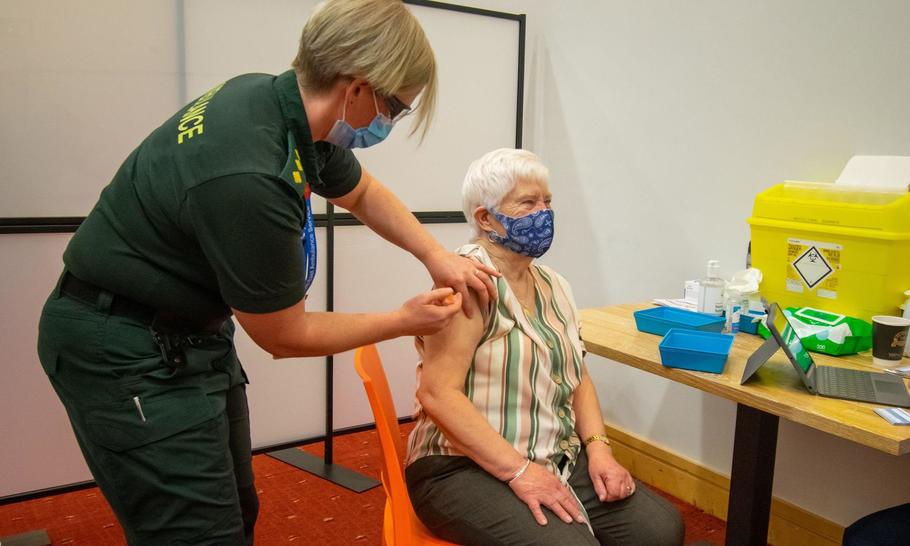Anti-vaccine mobs are a nuisance, but Covid is still a killer

Newcastle, UK. (Alamy Live News)
A foul-mouthed, menacing mob surrounds a minister walking to his office, forcing police officers to form a protective cordon around him. The target this week was Michael Gove, but those subjected to similar treatment have included Jeremy Vine, Jon Snow and Chris Whitty. The culprits in each case have been anti-vaccine campaigners, whose language and conduct is increasingly violent and extreme. They call themselves protesters, but they behave like vigilantes, pursuing politicians, journalists or anyone else whom they can demonise in their outlandish conspiracy theories.
The anti-vaxers who yelled “Arrest Michael Gove” yesterday claim that those responsible for the Covid jab — which has actually saved 120,000 lives in the UK alone — are criminals, but it is they whose behaviour crosses the line from legitimate protest to criminality. They threaten innocent people and their families at their place of work or even their homes. At their “rally for freedom” in Trafalgar Square last July, one speaker compared doctors and nurses who administer vaccines to Nazi war criminals and called for them to be “hung”. Yet their rabble-rousing tactics are deliberately intended to incite hatred and violence. Few anti-vaccine activists have so far been prosecuted, but unless these fanatics are curbed, sooner or later they will provoke a full-scale riot.
It is all the more unfortunate that this extremist wing of the wider anti-lockdown movement is hogging the limelight, because the latest news about the pandemic is a cause for concern. The anti-vax brigade are a nuisance, yet Covid is still a killer. What Britain needs is not a mob mentality, but a reasonable debate about what if any restrictions we may need. With 233 deaths from Covid reported on Tuesday and over 43,000 new cases, the figures are at their highest since last March. The UK now has the highest figures in Western Europe and some countries such as Germany have us on their red lists. According to Professor Neil Ferguson, at any one time in the past four months, well over one per cent of the population has been infected with Covid — as high a level as at any time during the pandemic.
We do not know why the numbers have been creeping up again, but more than one factor is likely to be responsible, including both the relaxation of restrictions and waning vaccine immunity. Ironically, because we were faster than others to vaccinate the population, we may also be the first to see the level of protection decline. A new variant known as AY.4.2 is estimated to have caused about 10 per cent of cases in the UK; it may be significantly more transmissible than the Delta variant that spread rapidly earlier this year.
The vaccine booster programme is still in its early stages, but there are signs that uptake is lagging, perhaps because many people wrongly imagine that the pandemic is over. On average about 150,000 jabs are being administered daily, far fewer than is needed. It is unclear whether doctors or patients are mainly to blame: the former because they are clearing backlogs, the latter because they are not coming forward as quickly as for their first jabs.
The Prime Minister sounded a reassuring note this week, pointing to the fact that “hospital admissions remain broadly flat”. He told the Cabinet: “Although we face a difficult winter, we have a plan in place.” But even if he is right that lockdowns are unlikely because the NHS is in no danger of being overwhelmed, that is no reason for complacency. The combination of Covid and a return of influenza could yet cost tens of thousands of lives at a time when the country is still in recovery mode. There is particular concern about care homes: 27.8 per cent of residents and just 14.1 per cent of staff have so far had their boosters. This leaves millions of vulnerable patients at risk.
Indeed, there is a need for hard decisions about the trade-offs between health and wealth. If we are going to live with Covid for the foreseeable future, how many deaths are acceptable? Are we comfortable with any restrictions on our lives at all? Mask wearing on public transport and elsewhere seems to have declined to perfunctory levels. But there is no discussion about the morality of what those with fragile health still regard as a cavalier attitude to their lives. The death this week of Colin Powell, the former US Secretary of State, after complications arising from Covid is a reminder that among the elderly and other high risk groups, nobody is invulnerable.
As Danny Finkelstein writes in The Times (behind a paywall), the lockdown sceptics “made so many bad arguments that it was sometimes hard to take them seriously”. Yet as he says, “they were right to argue that we need a proper calculation of the costs of lockdown and a national debate on how many Covid deaths we are willing to live with”. He is right that politicians don’t want to “go there”, but that does not mean no discussion can be had. We know that Boris Johnson has concluded that Britain must never again face the myriad costs of a lockdown, but he should be pressed on how many daily deaths the Government will accept before at least considering a “Plan B”. Come to that: what precisely is “the plan” that he says he has “in place”? Let the Prime Minister set it out in detail and tell Parliament what he means by a “difficult winter” ahead. This time, let us go into the next phase of a pandemic that is by no means over with our eyes open.
A Message from TheArticle
We are the only publication that’s committed to covering every angle. We have an important contribution to make, one that’s needed now more than ever, and we need your help to continue publishing throughout the pandemic. So please, make a donation.





